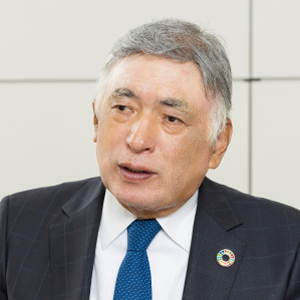
Katsumi Ihara
Chairman of the Board
and Nominating Committee
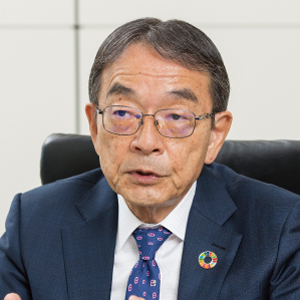
Takatoshi Yamamoto
Chairperson of
the Compensation Committee
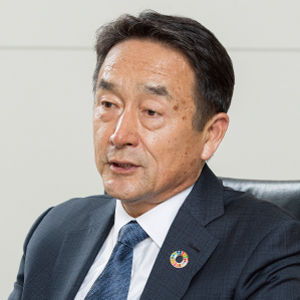
Hiroaki Yoshihara
Chairperson of
the Audit Committee
Board and Nominating Committee
Maintain and improve the effectiveness of the global top-tier Board,
and commit to future CEO succession planning
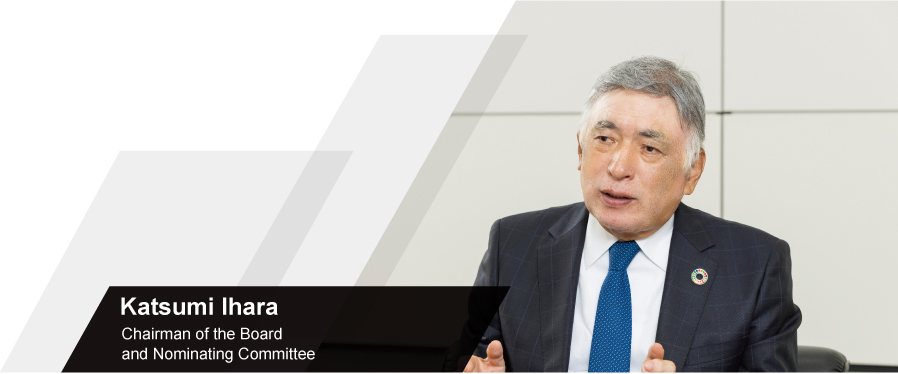
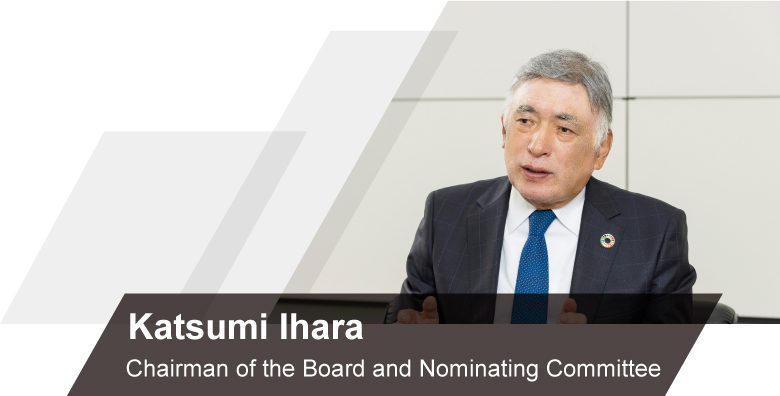
Hitachi is a company with a nominating committee, etc., and independent directors assume heavy responsibilities, such as serving as the chairperson of the Board and chairing the three committees. The current board is well balanced in terms of diversity such as skills, geography (Japan, the United States, Europe, India), and gender, and is composed of world-class members.
The board is responsible for corporate governance and separates its functions from the executive officers responsible for managing Hitachi. Each board meeting begins with a report by the CEO on the current status of the company, priority issues, and action to be taken, followed by an active discussion. In particular, the quality of management strategies is enhanced through in-depth discussions of the Mid-term Management Plan, the one-year business plan, and large-scale M&A projects. For example, some M&A projects proposed by executives are rejected after discussion, and it is fair to say that the board functions effectively through an open exchange of opinions.
The Nominating Committee, on the other hand, has three roles. The first is the selection of director candidates, the second is the formulation and proposal of CEO succession plans, and the third is the development of future CEO candidates. Hitachi’s Nominating Committee is unique in that it devotes a great deal of energy not only to selection but also to development. In addition to candidates for the next and subsequent CEO terms, Nominating Committee members are involved in the training of even younger candidates through interviews and lectures.
In fiscal 2022, COVID-19 subsided and directors became more active in their roles. Active communication was achieved through visits to business sites and exchanges of opinions with executive officers outside of meetings. Each year, through questionnaires and interviews with directors, we evaluate and verify whether the board is functioning properly and producing results, and how it is contributing to Hitachi’s growth. We have confirmed that a high level of effectiveness has been ensured, and this has continued from fiscal 2021.
To maintain and improve the effectiveness of the board, it is essential to recruit the right people to serve as directors. This is not an easy task. Hitachi regularly maintains and updates a list of potential board members worldwide. Given the diverse nature of Hitachi’s business and its focus on the digital field, we are now prioritizing candidates with global corporate management experience and expertise in the IT field.
In fiscal 2022, the members of the Nominating Committee continued to devote much time to developing the next generation of leaders. We conduct one-on-one interviews with the next and subsequent CEO candidates to confirm their growth as leaders and discuss challenges that will foster further growth. By conducting these activities on an ongoing basis, we are able to chart each candidate’s growth. We are also involved in the development of the Future50, younger future leaders, honing their leadership skills, global perspective, and strategy through interviews and lectures. We believe that it is very important for Hitachi to develop a pipeline of future CEOs and to improve the quality of this pipeline.
The first priority this fiscal year is to continue to review the board and CEO succession plan. We will select people with a robust process. The second is to ensure that the Mid-term Management Plan 2024 delivers results to meet stakeholder expectations. In fiscal 2022, we were able to achieve good financial results, and in fiscal 2023, we will continue to respond firmly to various risk factors to achieve the Mid-term Management Plan 2024 and deliver shareholder returns. Third, now that the major portfolio reforms have been completed, it is time to shift to organic growth. To make this shift, we need to transform Hitachi’s business into a globally competitive business. We have a mix of businesses that can compete in the global market and businesses that are yet to come, but we recognize that this transformation is a key issue for fiscal 2023 and 2024.
As Hitachi moves toward sustainable growth, the evolution of transparent and effective governance will continue to be required. Hitachi’s directors and executive officers have maintained a relationship that combines a healthy tension and mutual support, and they have been able to function well, which has contributed greatly to Hitachi’s transformation and growth to date. As Chairman of the Board and the Nominating Committee, I am committed to building a board that will continue this culture, even as the members change in the future, and to achieving continuous improvement in Hitachi’s corporate value.
Compensation Committee
Compensation is an engine for corporate growth, and a new compensation
structure will enhance corporate value and global competitiveness
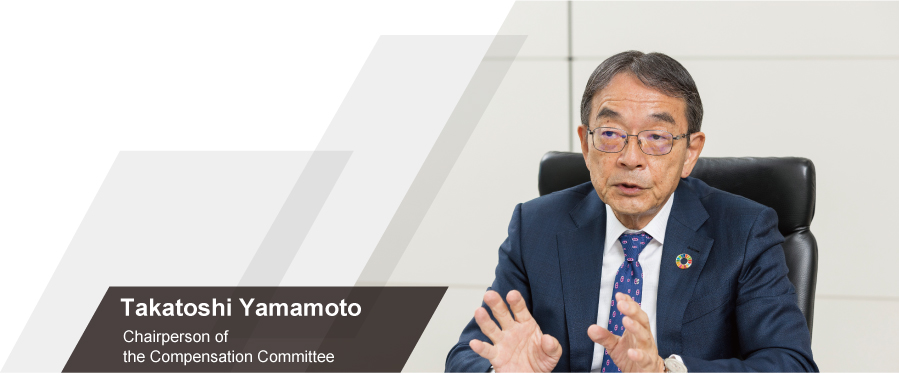
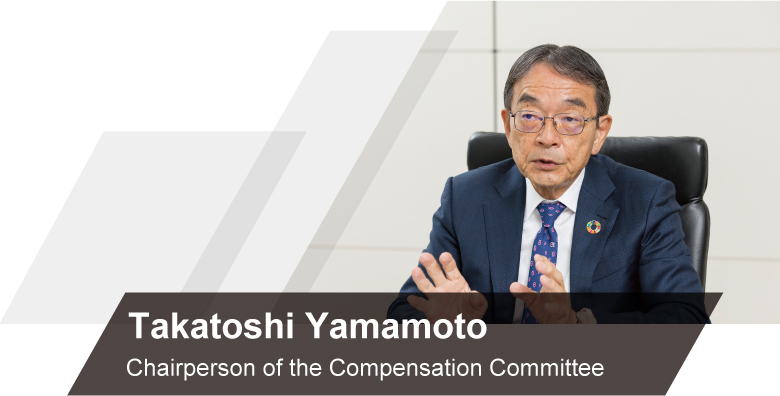
The roles of the Compensation Committee are to consider, create, and implement a compensation system for directors and executive officers that is desirable for Hitachi’s medium- to long-term vision. Specifically, the Compensation Committee decides the policy for determining the details of compensation for directors and executive officers and the details of individual compensation based on the policy. Of particular importance is ensuring objectivity, transparency, and fairness in the compensation determination process. This enhances accountability and disclosure.
I was appointed chairperson in June 2022. I believe that one of the important roles of the Compensation Committee is to review the compensation system for Hitachi’s further growth as a global company and to make the necessary revisions. I am working hard every day with the committee members and the secretariat to ensure that we can properly fulfill this role.
Compensation is an important driver of a company’s growth. To achieve global growth as One Hitachi, it is essential to secure and retain talented human resources, and to this end, we must increase the competitiveness of Hitachi’s compensation in the global market. Specifically, to realize the “Mode Change to Growth” stated in the Mid-term Management Plan 2024 and to continue to grow over the next 10 years, we investigated and thoroughly discussed the following three perspectives as issues regarding the future form of the executive compensation system: whether the current compensation level is appropriate, whether compensation is linked to the growth in corporate value, and whether compensation is competitive compared to global companies in Europe and the United States.
Looking back, Hitachi’s CEO compensation has increased at a CAGR of 15% from 2016 when Chairman Higashihara became CEO to the present. We believe that it is necessary to always be aware of whether this compensation is commensurate with the company’s growth and the market. In fact, Hitachi’s stock price continued to grow at a 16% CAGR with market capitalization at a CAGR of 17% during this period, while the TOPIX growth was a 6% CAGR. Comparison with the market and global competitors is very important.
Based on these findings, in fiscal 2022, we devoted more time to discussing the ideal compensation system. In April 2023, we revised the compensation system to reflect that content.
In making the revision, we also placed emphasis on ensuring pay-for-performance that rewards contributions to growth and innovation and measures that contribute to enhancing corporate value by strengthening sustainable management. One of the goals of the revision was to design a system that provides room for alignment with shareholders and other stakeholders, and to create a flexible budget system.
As a company committed to sustainable management, we have introduced sustainability targets as evaluation items. I believe that a company that cannot endorse or practice sustainable management will not be able to survive in the global market and enhance corporate value. To have Hitachi’s growth evaluated by aligning with the capital market, we need to project corporate value over three to five years, that is, over the medium to long term, based on sustainable management. I would like to have the perspectives of linkage with corporate value growth and global competitiveness, which were formed through those discussions, take root as a basic concept and culture so that present and future Compensation Committee members can share the same mindset in approaching issues.
In Japan, I believe that there are still few companies that have a globally accepted compensation system. I hope that the content of these revisions will be perceived as Hitachi leading the way in compensation structures as a global company.
In fiscal 2023, we will promote internal understanding of the revised compensation system and work to permeate and implement it. When applying it to individual evaluations, such as company-wide performance and divisional performance, we will organize and operate specific simulated issues on how to implement the evaluations also taking into account changes in the external environment. We will communicate thoroughly, including with non-Japanese executive officers.
Hitachi’s 12 directors also include nine independent directors. We believe it is necessary to also discuss a review of the compensation system for independent directors, who play a role in corporate management as a supervisory function. To accelerate the growth of Hitachi as a global company and respond to the changing times, I, as chairperson of the Compensation Committee, will strive to design and operate the compensation system while maintaining a high level of objectivity, transparency, and fairness at all times. We believe that the compensation system, which is a growth engine, should be an ideal form that supports further growth and serves as the basis of Hitachi’s corporate value creation scenario not only for the Mid-term Management Plan 2024 but also beyond into the future.
Audit Committee
Enhance corporate value through audits that contribute to achieving growth
and overcoming management challenges
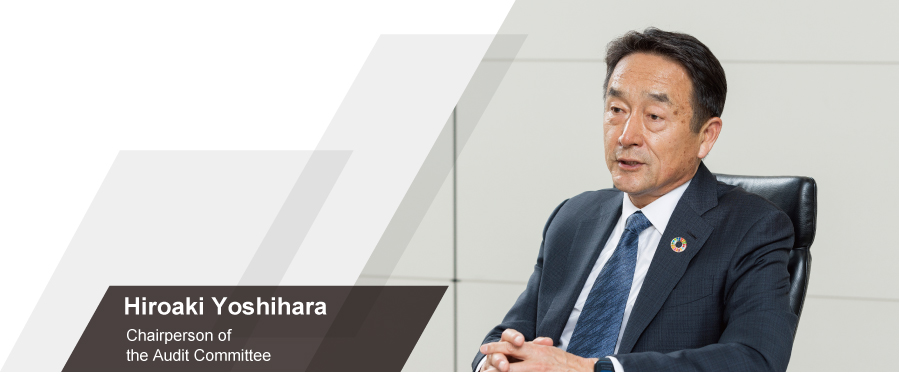
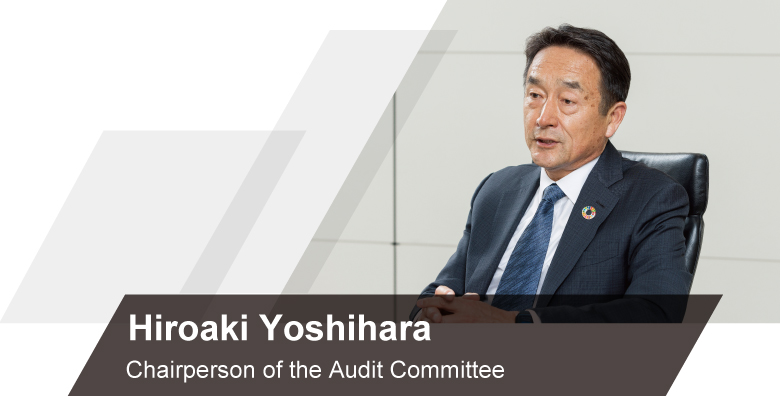
The role of the Audit Committee is to fulfill the trust of stakeholders by auditing the legality and appropriateness of the execution of duties by directors and executive officers and conducting accounting audits. Since Hitachi faced a major deficit in fiscal 2008, successive management teams have worked to strengthen its governance. One of the hallmarks of this is Tone at the Top, which means that management is keenly aware of the importance of governance for sound growth. It facilitates frank and honest discussions. As a member of the Audit Committee, I constantly consider how I can contribute to Hitachi’s goal of growth and overcoming management challenges.
The “growth” that Hitachi is aiming for not only means short-term growth in sales and profits but also very high-quality, healthy growth that can be sustained over the medium to long term, including non-financial factors such as human resources, organizational culture, and environmental value. I believe that it is necessary for the Audit Committee to engage closely with management while maintaining a constructive sense of tension and mutual understanding and respect for each other’s roles in order to improve corporate value in a balanced manner. By utilizing Hitachi’s “Tripartite Audit”*1 and triangular pyramidal monitoring system*2, we strive to improve transparency and the effectiveness of internal controls, and continue to evaluate each other’s performance and make efforts to improve while ensuring appropriate tension.
In fiscal 2022, we visited Hitachi Energy in Switzerland and Hitachi Rail in Italy, which were recent major acquisitions, and exchanged views directly with local management on the environmental business growth strategy and other issues to confirm the current concerns and future direction. We also conducted on-site assessment of global business risks by visiting three recently acquired CI sector companies and their holding company in North America to check the progress of post-merger integration (PMI) and the One Hitachi initiatives.
In the past few years, major structural reforms at Hitachi have progressed successfully, but structural reforms, including business portfolio transformation, are a process of achieving an ideal that has no end in sight, one that evolves every moment with the operating environment, and can be said to be an enduring proposition for the company. This is why our strong attention on measures against low-profit businesses and strategies to achieve higher levels of cash flow and ROIC, as well as our expected DX and GX investment returns, will continue to be important. In particular, one of our important roles is to monitor the soundness of long-term large-scale projects for Hitachi Energy and the railway systems business.
While we have these priorities, we will also pay constant attention to health and safety, quality assurance, compliance, and fostering a culture of thoroughness in these areas. Hitachi is committed to earnestly addressing these issues, analyzing the causes, and making efforts in the right direction, including reviewing and disseminating guidelines. The Audit Committee will continue to evaluate and assist with these issues.
In addition to further improving the audit items that we conduct every year, the Audit Committee will contribute to maximizing synergies in Hitachi’s business portfolio as One Hitachi. As Hitachi is a major company that is engaged in a variety of businesses, there are a wide range of opportunities to improve through greater efficiency, and improving the efficiency of global operations in particular is an urgent issue that we are addressing.
Regarding AI, which is an important theme today, Hitachi is utilizing generative AI to provide newer solutions in addition to the current control and analytic AI systems. Risk management related to AI systems provided by Hitachi within the company and for clients is becoming increasingly important. The Audit Committee will also closely monitor the progress while assessing the trends in AI-related global legislation.
For Hitachi to continue to grow soundly and become a global leader in the Social Innovation Business, the Audit Committee will make earnest efforts to support and monitor the execution of duties by management.
*1 Audit system based on cooperation and close communication among the Audit Committee, the Internal Audit Office, and the accounting auditor
*2 To strengthen the auditing system and functions, in addition to the current Tripartite Audit system, there is an oversight system, headed by the Audit Committee, that recognizes, assesses, and supervises and supports the resolution of material risks and issues in collaboration with the head office and business unit administration.